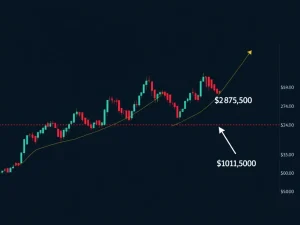SEC Staking Guidance: A Major Breakthrough for US Crypto Regulation

The US crypto industry just received a crucial piece of clarity regarding staking, a core activity for many digital assets. New guidance from the SEC’s Division of Corporation Finance offers a significant step forward. This development around SEC staking guidance is being hailed as a major win for the industry.
Understanding the SEC Staking Guidance
In a statement issued on May 29, the SEC’s Division of Corporation Finance addressed “Protocol Staking Activities.” Specifically, they clarified that activities like cryptocurrencies staked in a proof-of-stake blockchain “don’t need to register with the Commission transactions under the Securities Act.”
This distinction is key. The guidance focuses on the inherent protocol-level activity of staking within a proof-of-stake network, differentiating it from potential investment contracts that might involve third-party services or pooling arrangements.
Why This Guidance is a Win for Crypto Staking
Industry leaders are viewing this guidance positively. Alison Mangiero, head of staking policy at the Crypto Council for Innovation (CCI), called it a “major step forward” for the US cryptocurrency industry.
She told Crypto News Insights, “The SEC has now recognized what we’ve long argued: Staking is a core part of how modern blockchains operate, not an investment contract.” This clarity around crypto staking is critical for developers and participants alike.
The CCI’s Proof of Stake Alliance project, representing nearly 30 organizations, had previously engaged with the SEC’s Crypto Task Force, arguing that non-custodial or custodial staking service providers are distinct from investment contracts.
Implications for Crypto Regulation and Staking ETFs
Marcin Kazmierczak, co-founder and chief operations officer at RedStone, noted that the guidance marks a “notable shift from previous enforcement-heavy approaches.” He sees it as genuine progress toward regulatory clarity, though evolutionary rather than revolutionary.
This foundation is being laid for more comprehensive crypto regulation. A significant implication is the potential for staking ETF approval, which Kazmierczak suggests could become increasingly plausible, perhaps by late 2025.
Despite this positive guidance, the industry awaits decisions on specific products. The SEC recently delayed its decision on Bitwise’s application to add staking to its Ether (ETH) ETF, as well as its decision on Grayscale’s XRP (XRP) ETF.
Proof-of-Stake Validated as a Core Function
The SEC’s guidance provides validation for the proof-of-stake consensus mechanism itself. By stating that the protocol-level staking activity doesn’t require securities registration, the agency acknowledges the functional role staking plays in network security and operation.
This aligns with the long-standing arguments from groups like CCI’s Proof of Stake Alliance, who have educated policymakers that protocol staking is a core function, not merely an investment activity.
What’s Next for the US Crypto Market?
The SEC’s clarification is widely seen as a win for stakers and the broader crypto community in the US. It removes a layer of uncertainty surrounding the regulatory status of the fundamental act of participating in proof-of-stake consensus.
While the path to specific investment products like a staking ETF still involves regulatory hurdles and timelines, this guidance is a meaningful step toward clearer rules and potentially wider participation in the US crypto market.
Summary: The SEC’s recent guidance confirming that protocol staking activities don’t require securities registration is a significant positive development for the US crypto landscape. It provides much-needed clarity, validates the industry’s view that staking is a core blockchain function, and lays groundwork for future crypto regulation, potentially easing the path for products like staking ETFs, despite ongoing delays on specific applications.






